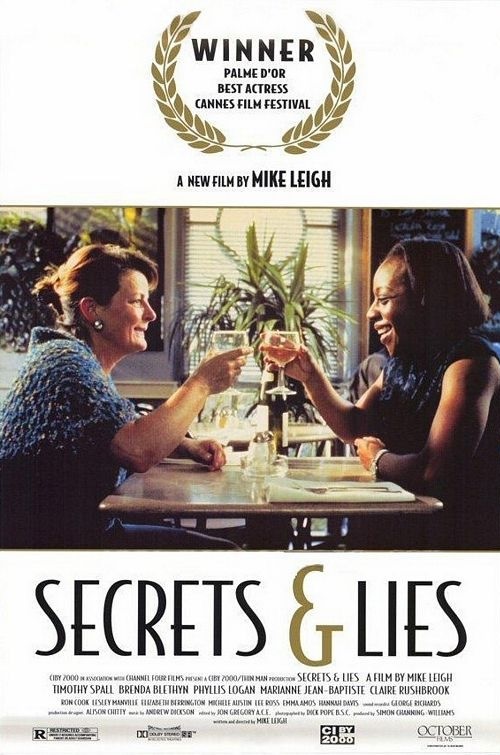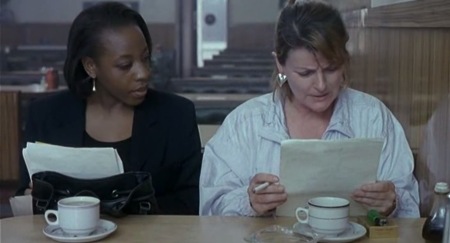Andrew with a Cannes edition of our monologue series...
 The 2014 Cannes Film Festival begins tomorrow and The Film Experience is doing its part to keep things Cannes focused with our list of favourite Palme D’Or winners, Diana’s upcoming coverage on the ground, and more. To continue the party let's turn to the Palme D'Or winner that topped my own team ballot, Mike Leigh's Secrets and Lies (1996).
The 2014 Cannes Film Festival begins tomorrow and The Film Experience is doing its part to keep things Cannes focused with our list of favourite Palme D’Or winners, Diana’s upcoming coverage on the ground, and more. To continue the party let's turn to the Palme D'Or winner that topped my own team ballot, Mike Leigh's Secrets and Lies (1996).
Brenda Blethyn plays Cynthia Purley, a woman who spends much of her time jabbering away (often incoherently). Like Anne Baxter, featured last week, it’s Brenda’s domination of her scenes that fool you into considering her scenes are more monologue-driven than they actually are.
[18 year-old spoilers follow...]
Secrets and Lies has a fine ensemble but it's impossible to look away from Brenda Blethyn's fantastic turn even when you want to - Cynthia can be draining, even overwhelming and exhausting to watch. Cynthia's arc is composed from a string of breakdown scenes wherein she's reacting to family secrets and issues and they are all pitched perfectly. The one which is most significant comes midway through the film when she meets the daughter she gave up for adoption some decades ago when she was a teenager.

Hortense (Marianne Jean-Baptiste, Oscar nominated) has come looking for her biological mother but Cynthia never saw the baby and is doubtful that this black young lady is that daughter she gave up. Hortense can only look on, seemingly as exhausted as we feel, while watching Cynthia internalise the information and then break apart a little. Cynthia is certain that Hortense is not, cannot be, her daughter.
“I mean…well, look at me.”
Listen, I don’t mean nothing by it darling, but I ain’t never been with a black man in my life. No disrespect nor nothing, I’d have remembered, wouldn’t I?”



(A few moments’ pause. A memory)
“Oh bloody hell. Oh Jesus Christ, oh my. I’m sorry sweetheart. I’m so ashamed.”
It’s a convulsive performance in every sense of the word but Brenda's characterization never feels forced. Secrets and Lies is notable, as all Mike Leigh films are, for being scripted largely through long months of improvisations with the actors in rehearsal. Cynthia’s fits, though sizeable, never feel disingenuous. Each bit of dialogue is matched with intermittent howls of feelings and twitchy physical movements. Leigh’s camera remains static, watching. This seven minute scene was shot in a single, uninterrupted take and it was the first time Brenda met Marianne, and realised that the actor playing Hortense was black. It helps in making the feverish pitch of her reaction here rooted in something real.
For all of Cynthia’s lower class faults Secrets and Lies subverts your expectations in treating her not with judgemental mockery but with compassion. Cynthia may seem unhinged, but the moment is tender.
“I can’t look at you.
I didn’t know sweetheart, honest I didn’t know. I didn’t know you was black. Daft, I thought they got the dates all wrong. All this time I thought you was born 6, 6 weeks premature. But you weren’t, you wasn’t.”

Hortense wants to know who her father was.
You don’t want to know that darling. Listen, I want to be honest with ya, but I can’t tell you that sweetheart, I’m sorry. I’m sorry. Look at ya. I’m a bit of a disappointment to ya ain’t I?”
We never do find out who her ather was, left to wonder with Hortense. But her praternity is less important than the bond the two women forge over the duration of the film. This is Brenda's moment, but Marianne Jean-Baptiste's quiet anger but warm watchfulness is essential to making Cynthia's confession work.
Before they leave the café Hortense asks, Why didn't you want to see me when I was born?

Well I couldn’t, I was too upset see. They wanted me to. They wanted me to hold you, but I couldn’t, I just couldn’t. I didn’t know if I was coming or going.
I was only a little girl myself, 16. I didn’t have no choice. If I’d of seen you I’d of wanted to keep you, you do believe me don’t cha sweetheart? I don’t blame ya darling.”
There are many facets to Cynthia Purley's character but it's her proclivity for self-flagellation which is most pervasive. It's a trait the small cast of characters seem to have in common, each of them carrying some type of guilt with them over the years. When the end comes and the secrets and lies are exorcised the film's conclusion feels earned and and movingly poignant. The kitchen-sink drama is one that the British have often excelled at though this outwardly modest subgenre rarely wins the approval of awards bodies. Even rarer are the films mentioned when lists of "Greatest ___" are compiled. So, I always hold its Cannes triumph as one of my favourite awards moments. Blethyn would go on to be a nominee in a truly excellent Best Actress Oscar lineup. It's difficult to grudge Frances McDormand her Fargo Oscar but for all the purported arbitrariness of awards whenever I catch a minute of this performance I always mourn the fact that so few remember or discuss it today.
Nathaniel asked on twitter which actor we miss. Brenda was the first name to come to mind. Few performances have ever moved me as much. Truly, a performance for the ages.